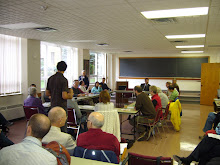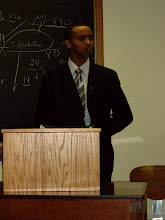Church Building in Quebec. The Secular Uses
by Richard Gauthier, PhD. (Trinity College)
As the sociologist Peter Berger wrote, Quebec, the former "priest-ridden" province, is now among the most secularized societies in the Western hemisphere. The impact in Church Building is the increasing number of the secular uses. The author present the phenomenon and, at the end, he proposes some ideas for the future.
Wednesday, February 13, 2008 3:00-4:00
Restoration of the Jerusalem Temple in Medieval Christian Liturgy
by Prof. Jennifer Harris, PhD. (St. Michael’s College)
A number of rites in the medieval Church borrowed their meaning and gestures from the long-destroyed Jerusalem Temple. In this seminar, I examine three types of borrowing that pervade Christian liturgy in the High Middle Ages: the ordo for the dedication of a church (and its annual commemoration), the Maundy Thursday liturgy performed once a year at the Lateran, and weekly eucharistic rites. My focus is on the Roman rites of the twelfth and thirteenth centuries.
by Prof. Jennifer Harris, PhD. (St. Michael’s College)
A number of rites in the medieval Church borrowed their meaning and gestures from the long-destroyed Jerusalem Temple. In this seminar, I examine three types of borrowing that pervade Christian liturgy in the High Middle Ages: the ordo for the dedication of a church (and its annual commemoration), the Maundy Thursday liturgy performed once a year at the Lateran, and weekly eucharistic rites. My focus is on the Roman rites of the twelfth and thirteenth centuries.
Wednesday, March 19, 2008 3:00-4:00
The Dialectic of Worship in The United Church of Canada
by Prof. William S. Kervin, ThD. (Emmanuel College)
Only recently has the history of worship in The United Church of Canada received significant scholarly attention. The methodological challenges of such study are challenging because its Reformed Protestant and “Free Church” roots render many text-based liturgical methodologies of limited use. This presentation (based on a chapter in a forthcoming history of the United Church) conceives the liturgical history of the United Church as an on-going dialectic in which the interplay of text and context results in a uniquely complex liturgical tradition. From the union of 1925 to the emerging postmodernity of the turn of the millennium, United Church worship has been both a reflection of, and window on, each era. Its major worship resources, liturgical patterns and conciliar politics reveals its liturgical life to be a context-specific tradition perpetually in the process of selective recovery and renewal.
by Prof. William S. Kervin, ThD. (Emmanuel College)
Only recently has the history of worship in The United Church of Canada received significant scholarly attention. The methodological challenges of such study are challenging because its Reformed Protestant and “Free Church” roots render many text-based liturgical methodologies of limited use. This presentation (based on a chapter in a forthcoming history of the United Church) conceives the liturgical history of the United Church as an on-going dialectic in which the interplay of text and context results in a uniquely complex liturgical tradition. From the union of 1925 to the emerging postmodernity of the turn of the millennium, United Church worship has been both a reflection of, and window on, each era. Its major worship resources, liturgical patterns and conciliar politics reveals its liturgical life to be a context-specific tradition perpetually in the process of selective recovery and renewal.
Subscribe to:
Comments (Atom)









